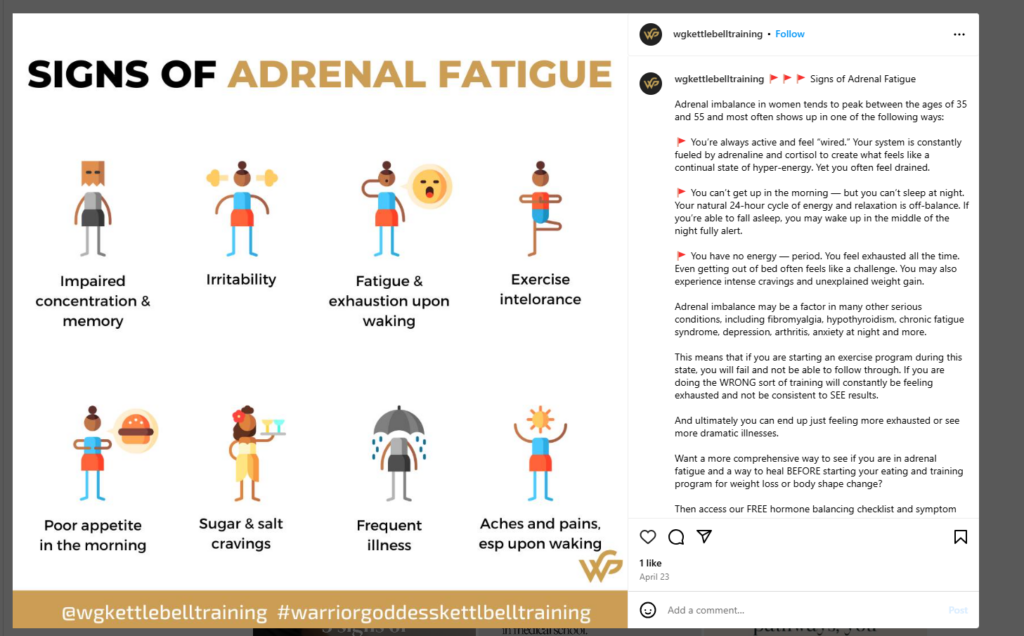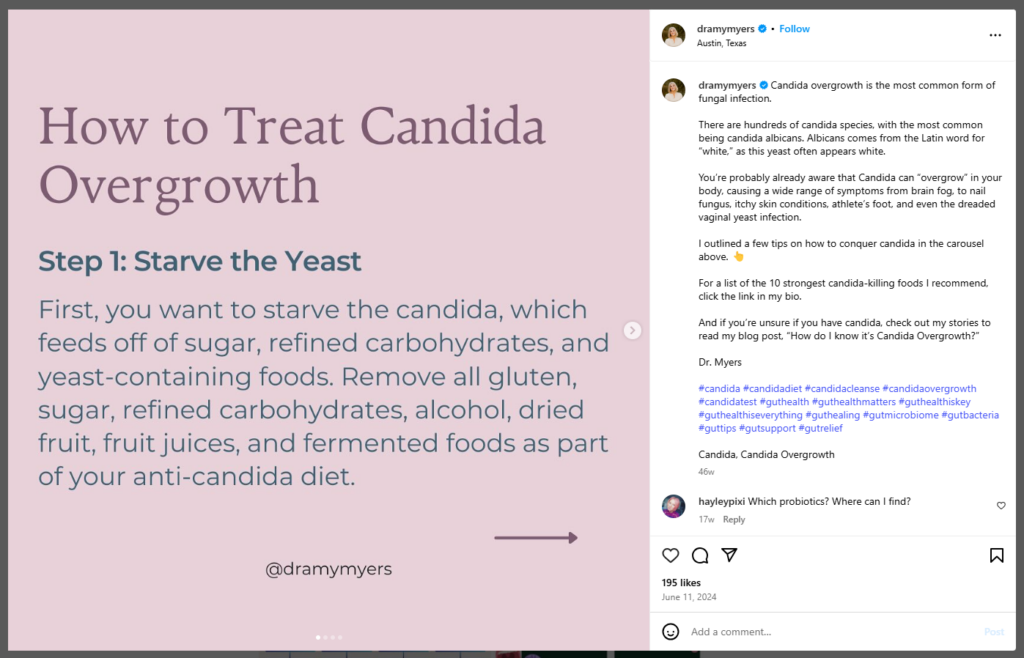The Rise of Misinformation within the Age of Wellness
From TikTok movies to Instagram infographics, well being and wellness content material is in all places. Whereas some creators are certified well being professionals, many aren’t—and even well-meaning influencers typically unfold misinformation. Situations like parasites, adrenal fatigue, Candida overgrowth, and chronically elevated cortisol from espresso incessantly pop up in social media feeds.


The issue? These circumstances are both misunderstood, extraordinarily uncommon, or not supported by science in any respect.
The attract is comprehensible: obscure signs like fatigue, mind fog, and bloating could make anybody fear. It’s tempting to latch onto a prognosis that appears to elucidate every thing, however misdiagnosis, pointless therapies, and anxiousness may end up from listening to and following unvetted recommendation.
Let’s unpack the details behind 4 well being circumstances which are extra internet-famous than scientifically grounded.
Parasitic Infections: Uncommon, however not Unimaginable
The Web Narrative:
Social media posts typically warn of “silent parasites” inflicting fatigue, pores and skin issues, and bloating, even in individuals who haven’t traveled internationally. “Parasite cleanses,” crammed with herbs and dietary supplements, are touted as important detox instruments.
Actuality Test:
In actuality, parasitic infections in international locations like Canada, the U.S., and most of Europe are uncommon exterior of particular contexts (e.g., poor sanitation, sure daycares, or worldwide journey). A Canadian research discovered that 29% of vacationers to growing areas contracted parasitic infections, however this doesn’t replicate the typical inhabitants.
Signs of actual parasitic infections fluctuate however sometimes embody diarrhea, malabsorption, weight reduction, anemia, not eczema and mind fog.
The signs are acute and infrequently extreme—not delicate fatigue or bloating. Diagnosing parasites requires stool checks or serology, not guesswork or on-line quizzes. Therapies are focused and evidence-based, not natural regimens from an influencer’s storefront.
Adrenal Fatigue: A Diagnostic Mirage
The Web Narrative:
“Do you are feeling drained on a regular basis, even after 8 hours of sleep? You may need adrenal fatigue.” Social media posts current adrenal fatigue as an epidemic of contemporary life attributable to stress, consuming an excessive amount of sugar, or sleep deprivation.


Actuality Test:
There isn’t a acknowledged medical situation known as adrenal fatigue. A 2016 systematic assessment concluded that “adrenal fatigue doesn’t exist,” with no scientific proof supporting the idea of underperforming adrenal glands as a result of stress.
Confusingly, adrenal fatigue is usually conflated with official medical circumstances like Addison’s illness or secondary adrenal insufficiency, that are severe and require medical therapy. These are recognized with blood checks and contain dangerously low cortisol ranges—not obscure signs that match burnout or melancholy.
The hazard of the adrenal fatigue fantasy is twofold:
Folks might delay getting correct prognosis for actual points like thyroid illness, anemia, or melancholy.
They might spend a whole lot of {dollars} on pointless dietary supplements or “adrenal assist” herbs with no confirmed profit.
Candida Overgrowth: Widespread Fungus, Unusual Drawback
The Web Narrative:
“You in all probability have Candida overgrowth and don’t comprehend it.” Influencers declare it causes every thing from mind fog to sugar cravings to zits. “Anti-Candida” diets and antifungal dietary supplements are standard on wellness platforms.


Actuality Test:
Candida is a yeast that lives in your pores and skin and in your intestine. Overgrowth can occur—however virtually completely in immunocompromised people, individuals on long-term antibiotics, or these with diabetes. Widespread kinds of overgrowth embody:
Oral thrush (white patches within the mouth)
Vaginal candidiasis (itching, discharge)
Invasive candidiasis (uncommon and infrequently seen in ICU sufferers)
Research like this one on psoriasis sufferers present Candida colonization in particular populations (PMID: 39720714), however no proof helps the concept of a widespread epidemic of “systemic candidiasis” in wholesome people.
Anti-Candida diets are overly restrictive and may result in disordered consuming. Worse, they might distract from discovering the true root reason behind signs like fatigue or bloating (e.g., IBS, stress, thyroid dysfunction).
Espresso and Cortisol: The Stress Hormone Delusion
The Web Narrative:
“Espresso spikes your cortisol and retains you in fight-or-flight mode all day.” Some wellness figures declare espresso is a root reason behind hormone imbalance, weight acquire, and burnout—particularly in ladies.
Actuality Test:
Caffeine could cause a short lived rise in cortisol, particularly in people who find themselves caffeine-naïve. However in ordinary espresso drinkers, the physique shortly adapts. A 2024 randomized trial discovered that caffeine ingestion didn’t considerably alter every day cortisol ranges in ordinary customers.
Earlier analysis from 2008 confirmed that whereas an 800 mg dose of caffeine may improve cortisol by about 52%, these results have been transient and returned to baseline. The advisable caffeine consumption shouldn’t exceed 400mg per day, which is concerning the equal of three cups of espresso. Average espresso consumption (1–3 cups/day) might even be useful for metabolic and mind well being.


Actual Cortisol Issues
If somebody really has persistent excessive cortisol, it’s not from Starbucks—it’s from a illness like Cushing’s syndrome. This uncommon situation (2.2 per 100,000 individuals;) is attributable to tumors (pituitary or adrenal), not weight loss program.
Signs embody:
Fast weight acquire (particularly within the face/stomach)
Skinny pores and skin, straightforward bruising
Muscle weak point
Hypertension and blood sugar
Cushing’s syndrome requires endocrine analysis, imaging, and generally surgical procedure—not giving up your morning latte.
Why Misinformation Persists—and why it’s Harmful
Social media algorithms reward daring claims, private anecdotes, and visually interesting content material—not nuance, proof, or context. This makes platforms fertile floor for pseudoscience. Probably the most viral well being content material tends to:
Supply easy explanations for advanced issues
Validate individuals’s signs with straightforward solutions
Promote a product because the “resolution”
This creates a vicious cycle: individuals really feel seen, purchase a complement, after which grow to be a part of the testimonial echo chamber—even when the underlying reason behind their signs was by no means investigated correctly.
Potential Penalties:
Delayed prognosis of actual medical circumstances
Wasted cash on unproven therapies
Worsening anxiousness about regular bodily features
Disordered consuming pushed by restrictive “therapeutic” diets
How one can Suppose Critically About Well being Content material
Listed here are a number of inquiries to ask your self whenever you encounter well being claims on-line:
Who’s making the declare? Are they a licensed healthcare supplier?
Is it primarily based on peer-reviewed analysis? Search for PubMed citations, not blogs.
Is the situation acknowledged by main medical our bodies? Test CDC, WHO, or nationwide endocrinology societies.
Is the therapy supported by medical proof? Testimonials aren’t science.
Does it sound too good to be true? If sure, it in all probability is.


Proof-based medication isn’t all the time flashy, however it’s reliable. When you’re experiencing persistent signs, the perfect first step is to see your healthcare supplier.
Ultimate Ideas
Feeling drained, foggy, or bloated doesn’t imply you’ve gotten a parasite, adrenal fatigue, systemic Candida, or coffee-induced cortisol overload. These narratives, whereas compelling, are sometimes constructed on shaky foundations. Whereas it’s vital to validate individuals’s signs, the perfect assist comes from readability, not confusion.
Belief science. Query oversimplified solutions. And by no means underestimate the ability of night time’s sleep, balanced meals, and dependable medical care.
Whilst you’re right here…
I’ve just lately made the choice to take extra shoppers in my non-public apply! When you’ve been eager to work with knowledgeable to succeed in your diet and well being targets, I’m right here to assist.
Get 10% off any of my counselling packages (3 or 5 periods) with the code BUILD10. Extra data and reserving hyperlink right here.


